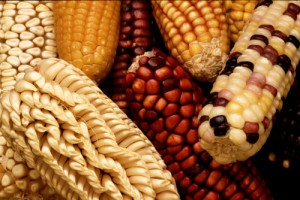Comment before midnight Tuesday, Mar. 4 (11:59 p.m. Eastern)
 Farmers who don’t want to grow GMO crops must establish wide buffer zones to protect their crops. Farmers who don’t want to grow GMO crops must establish wide buffer zones to protect their crops.Action Alert – Quick Links
|
Submit Comments on Proposed Coexistence with GMOs
It’s a fact: farmers’ crops have been contaminated with genetically engineered crops, also known as GMOs. And as long as the U.S. allows GMOs to be planted, this will continue and likely increase.
Tell the U.S. Department of Agriculture (USDA) to prevent contamination and put the costs where they belong!
Who is responsible for GMO contamination?
Farmers who don’t want to grow GMO crops face significant burdens. To protect their crops, farmers must establish wide buffer zones, losing the use of significant amounts of land. They spend time and extra money to find non-GMO seeds. And if they are contaminated despite their efforts, they lose sales in organic and non-GMO markets.
In 2011, the USDA convened an advisory committee to discuss the issue. The topic was labeled “co-existence,” based on the assumption that GMO and non-GMO crops can co-exist in the same area. But that’s already been proven false: non-GMO farmers are inevitably harmed by pollen that is blown or carried onto their farms, GMO material caught in harvesting and cleaning equipment, and the numerous other ways that contamination occurs.
Tell USDA to put the burden where it belongs.
The advisory committee recommended that farmers buy crop insurance to cover the costs of unwanted GMO contamination. How is this fair? Organic and other non-GMO producers would have to spend even more money to protect themselves, while the companies that profit from GMOs would continue to escape their responsibility for GMO contamination prevention and compensation.
USDA is now asking for comments from the public on the issue of co-existence. Tell them it’s time to take steps to prevent contamination and put the costs where they belong!
TAKE ACTION – SUBMIT COMMENTS TO USDA
Submit comments to USDA for Docket ID APHIS-2013-0047. The deadline for comments is Tuesday, March 4, 2014 before midnight (11:59 p.m. Eastern).
Click here to Submit Comments Online or go to
http://www.regulations.gov/#!submitComment;D=APHIS-2013-0047-0061
FARMERS & GRAIN HANDLERS: Share your experiences about contamination on your farm or as a buyer. If you’ve been directly impacted by contamination, please explain the circumstances and consequences. Several people on the USDA advisory committee still claim that contamination isn’t really a problem, and they need to know they are wrong!
CONSUMERS: Are you concerned about GMO contamination of your food? Tell USDA to focus on preventing contamination in the first place. See Talking Points and the Sample Comment below. Even a few sentences make a difference!
To Submit Comments to USDA Online:
|
TIPS:
- Write your comment ahead of time and save it on your computer. Because there is a time limit when using the Federal Register System, you may get timed out if you write your comment from scratch.
- If your comment is less than one page (5000 characters including spaces), you can copy and paste it directly into the “Comment” box.
- If your comment is longer, write “see attached” instead and UPLOAD a separate document with your comments, such as a Word or PDF file.
- The “Comment” box counts the characters and spaces so you’ll know if your comment is more than 5000.
To Submit Comments to USDA by Mail:
- Docket No. APHIS-2013-0047
Regulatory Analysis and Development, PPD
APHIS, Station 3A-03.8
4700 River Road Unit 118
Riverdale, MD 20737-1238
 |
Farmers who don’t want to grow GMO crops face significant burdens. To protect their crops, farmers must establish wide buffer zones, losing the use of significant amounts of land. They spend time and extra money to find non-GMO seeds. And if they are contaminated despite their efforts, they lose sales in organic and non-GMO markets.
Tell the USDA to put the costs where they belong and help prevent contamination!
- GMO-free agriculture must be protected from GMOs. Mandatory practices should be established to prevent GMO contamination, such as requiring farmers planting GMOs to use buffer zones, rather than placing that burden on non-GMO farmers. Those who choose to plant GMO crops should absorb the full costs of their actions.
- GMO crops can contaminate non-GMO crops, so restrictions should be in place to stop allowing the planting of GMO crops whose pollen is easily spread long distances, such as alfalfa and sugar beets.
- The cost is now placed on the farmers of contaminated crops, but it should be the other way around. Farmers should not shoulder the burden through GMO contamination crop insurance. Instead, the companies that hold the patents on the GMO crops should be held responsible for the contamination. Those who own, promote, and profit from GMO crops must be held responsible for the economic and market harm their products cause.
SAMPLE COMMENT
As always, please remember to personalize your comments! Even a couple of sentences in your own words, with or without our specific talking points added, make an impact.
Once you’ve personalized this comment, you may copy and paste it into the “Comment” box.
- I am writing to urge the USDA to establish fair standards that protect all U.S. growers. Co-existence is a meaningless concept if the burden continues to fall on the farmers who are trying to grow non-GMO crops.
Specifically, I urge the USDA to:
- Implement mandatory contamination prevention measures to protect non-GMO agriculture.
- Stop allowing the planting of GMO crops whose pollen is easily spread long distances, such as alfalfa and sugar beets.
- Place the costs for contamination on the companies that benefit from GMOs, not on the farmers that are trying to avoid GMOs.
(function(d, s, id) { var js, fjs = d.getElementsByTagName(s)[0]; if (d.getElementById(id)) return; js = d.createElement(s); js.id = id; js.src = “//connect.facebook.net/en_US/all.js#xfbml=1”; fjs.parentNode.insertBefore(js, fjs); }(document, ‘script’, ‘facebook-jssdk’));